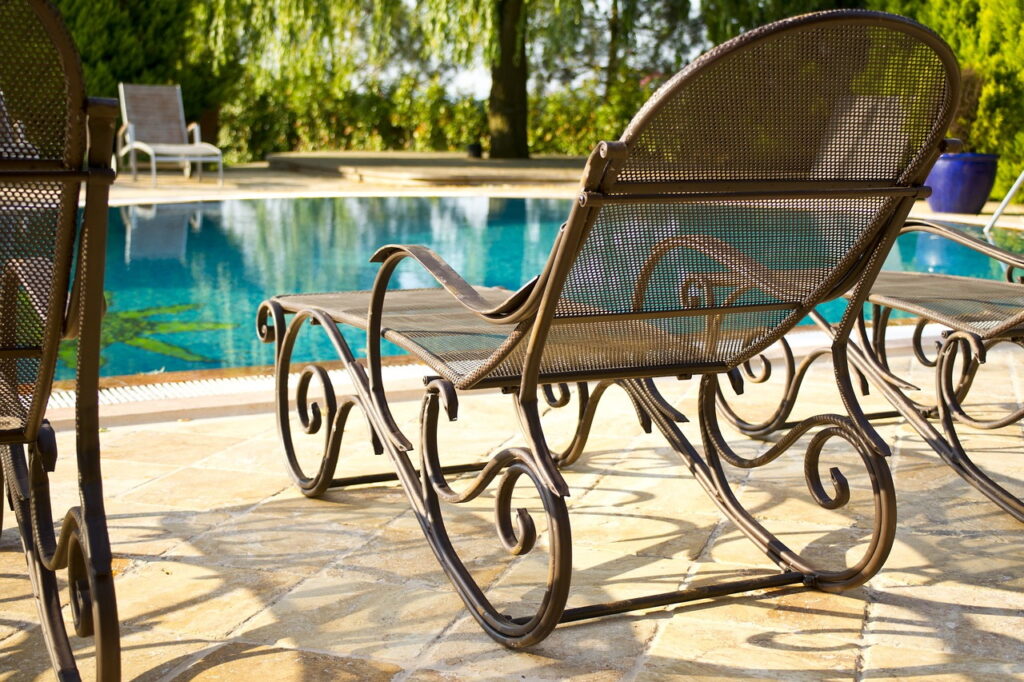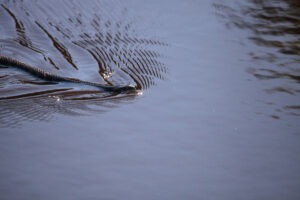
If you live in an area where rattlesnakes are common, you may be wondering if getting a pool is the right choice for you. Do rattlesnakes go in swimming pools?
Here’s what I’ve seen:
Rattlesnakes do not go willingly into swimming pools because the chlorine is poisonous to them. If rattlesnakes do end up in your swimming pool, they were likely chasing prey and fell in. They may be attracted to freshwater ponds and fountains though.
No one wants their pool party to be ruined by a dangerous snake, so we’ll help you fin some ways to prevent rattlesnakes from going into your pool. This will keep both you and the snake safe.
What Attracts Snakes to Your Yard?
As mentioned previously, chlorine is poisonous to snakes, so they are not in your yard for the pool. So what are they doing in your yard in the first place?
Long grass and unkept bushes
Snakes and rattlesnakes like to hide in the tall, long grass.
When you don’t mow your lawn for a while, the rattlesnakes are more likely to go there. This is the same for unkept bushes. This is a great hiding place for snakes because they enjoy the shade and protection. Keeping your grass regularly mowed will make snakes uncomfortable being there because they cannot hide as easily.
Also keeping your bushes and the surrounding areas trim and clean is a great prevention method of snakes and rattlesnakes.
Mice and other small animals
If you have a mouse or rat population on your property, you should take care of that immediately.
Rodents are a huge draw for rattlesnakes, as this is their main food source. If you are having a rodent problem, you can get a cat, set up traps, and/or call a professional to deal with this. This is the biggest draw for snakes and should be taken very seriously.
Feeding your pet outside
Although snakes will not eat the leftover food from your pet, they will be drawn to your yard because open food draws rodents.
Rodents, especially mice, are the preferred prey for many kinds of snakes. If you feed your pet outside and cannot move indoors or to the garage, you should make sure you clean up any uneaten and leftover food right after your pet has finished eating.
This is one of the best prevention methods.
Having standing water in your backyard
Snakes will not go into your pool if there is chlorine in it, due to the fact that it is poisonous to them.
However, snakes and rattlesnakes will go into your yard if you have still standing water that is not poisonous. Snakes need to drink and will go to any puddle, dog bowl, open tire, pond, or any other area in your backyard which catches rainfall and sprinkler water.
Hot concrete
Because snakes and rattlesnakes are cold-blooded, they love to sunbathe on warm concrete if the air temperature is on the cooler side.
To prevent this, you can spray the concrete around your home with white vinegar or ammonia. Snakes and rattlesnakes have a strong aversion to the smell of these substances and will avoid them. Keep in mind, humans might have a problem with the smell too!
These simple steps will help snakes avoid your home and the area around it.
How to Keep Rattlesnakes Away From the Pool

There are a couple of different tips and tricks you can keep in mind to prevent snakes and rattlesnakes from going into your swimming pool.
Keep them out of your yard
The best way to keep them out of your pool is by keeping them out of your backyard. Above, we talked about some easy ways to make your yard undesirable to snakes.
Regularly mowing your grass is the first thing you can do to keep snakes away. Snakes like to hide in tall grass.
During the growing season, you should be mowing regularly to keep your grass short. Mice and other small rodents like tall grass as well, so keeping it short will remove their hiding spots. If your grass is short, you will also have an easier time spotting a snake if it does enter your yard. You don’t want to sneak up on them by accident!
Keeping your bushes trim and neat as well. Not only will your yard look nicer, but you will also have less worry about snakes in your yard. Rattlesnakes and other snakes enjoy hiding in the bushes. When you keep the bushes trim and neat they have fewer places to hide.
Along with trimming your bushes, cleaning the surrounding ground area is a great way to prevent snakes. Removing any fallen leaves, branches, rock or woodpiles, junk, or other debris from the bottom of your yard to remove potential hiding places.
Check your pool’s landscape

If you have a lot of tall grass, bushes, or anything that can provide a hiding spot, such as pool toys, towels, or furniture, there is a greater chance of snakes and rattlesnakes hiding right next to the pool. Keeping these areas clean and trim is vital to prevent rattlesnakes from going into your pool.
Remind snakes that humans live there
Snakes and rattlesnakes generally try to avoid humans as much as we try to avoid them.
Hair from a brush, or anything with your scent on it may help keep snakes away from the pool. Leaving something with your scent on it next to the pool will help you mark it as human territory. This can even be effective during nighttime when rattlesnakes are more active.
How to Remove Snakes From Your Pool/yard
Let’s say you have done all you can to prevent their arrival, but you still have a snake or rattlesnake show up in your backyard.
In many cases, snakes will leave on their own if they know they are on human territory. But if it just won’t leave, you’ll need to do something about it.
When you’re dealing with a wild snake, it is safest to assume the snake is poisonous. Better safe than sorry! Complete all cautionary actions to protect yourself from the snake, such as maintaining your distance, and calling professional help.
But do remember that attacking a rattlesnake is one of the main ways people get bitten, so never attempt to capture it, kill it, or throw objects at it.
But while snakes may avoid heavily chlorinated pools, there are some snakes that both live and BITE underwater!
Click that link to read my comprehensive list on my site. I break down what snakes do like water, whether they are poisonous, and how to avoid getting bitten!
